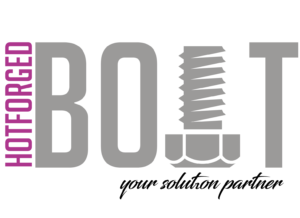What is a Hot Forged Bolt?
A hot forged bolt is a type of fastener that is manufactured using a hot forging process. In this method, metal is heated to a high temperature and then shaped into the desired form through mechanical force. This process enhances the material’s strength and ductility, resulting in bolts that exhibit superior mechanical properties and resistance to stress and fatigue.
Hot forged bolts are commonly used in applications where high strength and reliability are critical, such as in construction, automotive, aerospace, and heavy machinery. The forging process also helps in eliminating internal defects, providing a more uniform structure and improved performance compared to cold-formed or cast bolts.
Standards for Hot Forged Bolts
Hot forged bolts must adhere to various industry standards to ensure quality, performance, and safety. Some key standards include:
ASTM A325: Specifies requirements for structural bolts for use in steel structures. It covers high-strength bolts and their properties.
ASTM A490: Covers the specifications for heavy hex structural bolts made from heat-treated alloy steel.
ISO 898-1: International standard that specifies mechanical and physical properties of fasteners made of carbon steel and alloy steel.
DIN 931/DIN 933: German standards for hexagonal bolts and screws, detailing dimensions, mechanical properties, and grades.
SAE J429: The Society of Automotive Engineers standard for mechanical and material properties of fasteners used in automotive applications.
BS 3692: British standard for the mechanical properties of bolts, screws, and nuts.
API Specification 20E: Standards for bolts used in the oil and gas industry, ensuring reliability in harsh environments.


